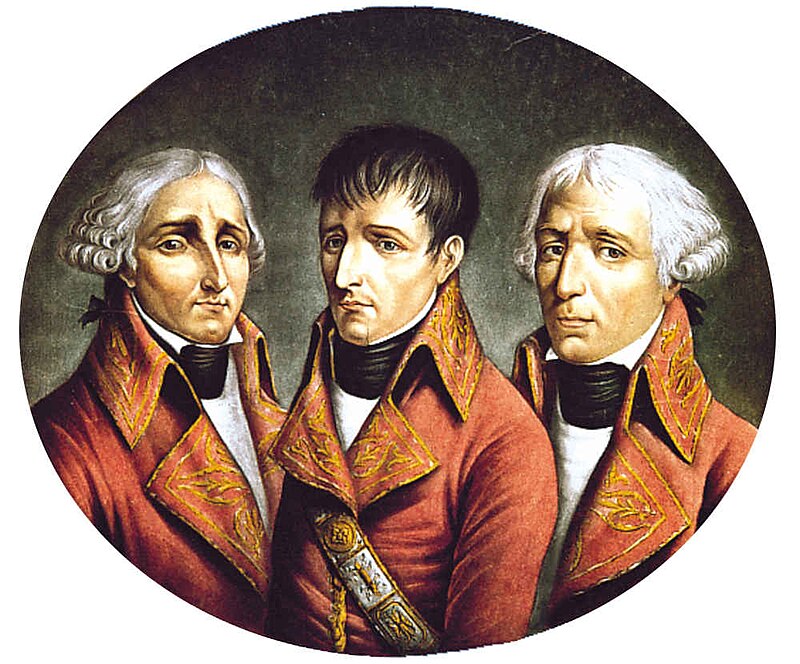Today in Social Sciences, we have studied the Consulate, the Coronation of Napoleon, the Napoleonic Empire, the French Ivasion of Russia, the End of the Napoleonic Empire and the Legacy of the French Revolution.
The Consulate was the new government of France from the fall of the Directory with the coup of Brumaire in 1800 until the start of the Napoleonic Empire in 1804. Napoleon became First Consul of a triumvirate (together with Ducos and Sieyès). In 1802 Napoleon became the only Consul for life, and in 1804 he decided to crown himself Emperor.
 |
| The three Consuls |
 |
| Napoleon as First Consul |
His popularity was huge due to his military success against his enemies. Many European territories became part of his Empire and other kingdoms were allies. Only Great Britain and Portugal challenged his power.
 |
| The Napoleonic Empire |
In 1805 Napoleon established the Continental Blockade: Buying or selling products to Great Britain was forbidden. Portugal and Russia defied this order. Napoleon planned the invasion of Portugal first and the invasion of Russia later.
The Russian Campaign was a complete disaster for the Napoleonic Empire. The extreme cold, the scorched-earth tactics and the guerrilla warfare practiced by the Russians obliged Napoleon to order the retreat, after losing 500.000 soldiers (only 120.000 out of 600.000 soldiers came back).
 |
| Napoleon's Retreat from Russia |
The Imperial Army was defeated by the coalition armies of Russia, Prussia, Austria and Sweden in the Battle of Leipzig. After the invasion of France, Napoleon was obliged to abdicate in April 1814 and he was banished to the Island of Elba.
 |
| Island of Elba |
In March 1815 Napoleon came back to France for a short period (100 days). A new coalition was formed to stop him. Napoleon tried to invade the Low Countries, where the troops of the Seventh Coalition were concentrated. The imperial troops were defeated by the coalition of a British, Dutch and Germans led by the Duke of Wellington. After his defeat Napoleon was exiled in the island of Saint Helena, where he died in 1821.
 |
| Island of Saint Helena |
 |
| Legacy of the French Revolution |
Vocabulary.
Commander in chief: comandante en jefe.
Grande Armeé: Napoleonic Army.
In command: al mando.
Surrender: rendirse.
Withdraw: retirarse.
Withdrawal: retirada.
For homework we have to summarize the Napoleonic Empire and the legacy of the French Revolution.
1 comment:
Hello,
These are my corrections. You have to explain the lesson, including your classmates' questions, not only the content of the presentation. You have to work harder:
Today in Social Sciences, we have studied theConsulate, the Coronation of Napoleon, the Napoleonic Empire, the French Invasion of Russia, the End of the Napoleonic Empire and the Legacy of the French Revolution.
The Consulate was the new government of France from the fall of the Directory with the coup of Brumaire in 1800 until the start of the Napoleonic Empire in 1804. Napoleon became First Consul of a triumvirate (together with Ducos and Sieyès). In 1802 Napoleon became the only Consul for life, and in 1804 he decided to crown himself Emperor.
His popularity was huge due to his military success against his enemies. Many European territories became part of his Empire and other kingdoms were allies. Only Great Britain and Portugal challenged his power.
In 1805 Napoleon established the Continental Blockade: Buying or selling products to Great Britain was forbidden. Portugal and Russia defied this order. Napoleon planned the invasion of Portugal first and the invasion of Russia later.
(...)
The French armies spread the ideas of the French Revolution (freedom, equality, end of privileges, absolutism and feudalism, division of powers, right to vote for the citizens) throughout Europe. Although the Napoleonic army was defeated, these ideas remained.
Bye.
Post a Comment